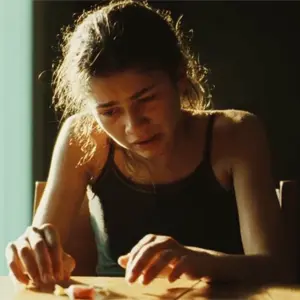"Doom watching" has become a big part of the Euphoria phenomenon
-

Euphoria fans find the teen drama's storylines dealing with addiction, grief and betrayal to be anxiety-inducing. Yet they keep coming back for more, as shown by the rise in viewership for the more traumatic Season 2. Sabrina Romanoff, a clinical psychologist in New York, attributes the show’s success to a phenomenon she calls “doom watching,” a cousin of doomscrolling, consuming bad news ever-present via our phones. Romanoff tells The Times that with “doom watching,” people watch intense shows that feed off their own anxieties, especially at night when other distractions might not be as readily available. She sees it as a method of projection, specifically “projecting the personal fears and stressors of oneself to the collective group or external and fictionalized television characters.” Romanoff adds: "There is a parallel process between the characters they’re watching onscreen and viewers’ own willingness and ability to adapt to the pandemic. Viewers are watching various stories unfold that center on the question: Would you do whatever is necessary to get what you want?” But Romanoff sees Euphoria as being positive in teaching about education and understanding mental health and drug addiction struggles. “The show has important implications when it comes to increasing awareness and empathy for addiction, mental health, sexuality and relationships," she says. "It encourages important conversations and self-reflection.”
ALSO:
- Euphoria is an accurate depiction of the drug abuse experience: "Euphoria, for me, is less glamor and more mirror," says Natalie Alcala. "It’s a reflection of what the drug abuse experience really looks like. Drugs were my escape from my mind. I had never met my biological father, and clearly, I had a less-than-ideal stepfather. I thought, What else could really go wrong if the odds are against me anyway? I thought I had nothing else to lose, so I started to challenge my existence. Drugs allowed me to break free from my issues instead of face them. I liked to dance around like Rue. I also liked to play cards (especially Speed, ironically) and color pages for hours. Drugs are also dark and make you self-destructive. Euphoria accurately portrays that side as well. I have been in some scary rooms with some very shady people when picking up eight balls. All walks of life are in those rooms, just like at drug lord Laurie’s home. You start thinking, How the f*ck did I get here? But you keep going back, until you have nothing else to live for but the next hit."
- Why Season 2 is focusing on Maude Apatow's Lexi and Angus Cloud's Fezco: "In terms of actual story, what’s changed in Season 2 can be neatly summed up by the increased prominence of two characters: drug dealer Fezco (Angus Cloud), who keeps a watchful eye on protagonist Rue (Zendaya) even as he sells her drugs, and shy nerd Lexi (Maude Apatow), Rue’s former best friend and the younger sister of beautiful, popular Cassie (Sydney Sweeney)," says Alison Herman. "Starting with last month’s premiere, Levinson paired the two up in an unlikely friendship—possibly a budding romance. Depending how you looked at it, the combination was either a self-aware nod to how underused both characters were in Season 1 or a rote solution to how Euphoria could use them better."
- Maude Apatow on her showcase Euphoria episode: Apatow says Sam Levinson "told me when I signed onto the show that season 1 was gonna be pretty light, and then season 2 is where my arc would happen. So I definitely went into it knowing that, and yeah, season 1 I didn't have as much to do, but I knew that I was waiting for my moment. It was coming later."
- Euphoria composer Labrinth doesn’t necessarily consider himself a composer: “I know I am, but I don’t look at myself that way,” he tells Variety. “I’m just transmitting energy that I hear and see and feel.”
- Chloe Cherry talks about transitioning from the adult film industry to Euphoria
- Production designer Jason Baldwin Stewart breaks down his complicated set for Lexi's meta high school play
- Ranking Euphoria's Season 2 side characters
- Maude Apatow used clever lighting tricks to hide her "gigantic zits" while filming in Season 2
TOPICS: Euphoria, HBO, Angus Cloud, Chloe Cherry, Labrinth, Maude Apatow, Zendaya
More Euphoria on Primetimer:
